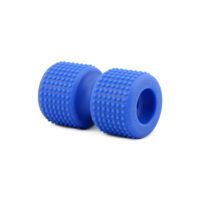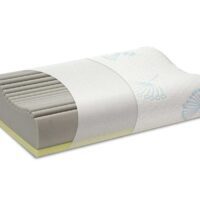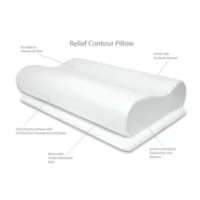Cervical Radiculopathy
Article by John Miller


Cervical Radiculopathy
Understanding and Managing Neck and Arm Pain
Introduction to Cervical Radiculopathy
Cervical radiculopathy, commonly known as a pinched nerve, is a condition where a nerve root in the cervical spine becomes compressed or irritated. This results in pain, weakness, or numbness radiating along the arm. Despite its technical name, this condition can significantly affect one’s daily life.
Why Does Cervical Radiculopathy Occur?
This condition primarily arises from the irritation of nerve roots exiting the spinal column. Two main causes are:
- Physical Compression: Occurs when a bulging disc or bony growth at the vertebra’s edge applies pressure on the nerve, leading to symptoms like arm pain, weakness, or numbness.
- Chemical Irritation: Results from inflammation around the nerve root.
Symptoms
The hallmark symptom is neck pain extending down the arm, often with the arm pain being more intense than the neck pain. Impaired nerve function can also cause reduced sensation and muscle weakness in the affected arm areas.
Diagnosis
Physiotherapists or doctors diagnose cervical radiculopathy by assessing neck and arm pain sources. This involves questioning, palpating neck muscles and joints, and conducting nerve tests. If necessary, an MRI, CT scan, or X-ray may be used for further investigation.
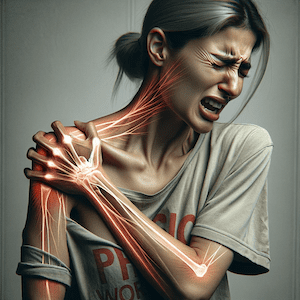
Treatment Approaches
- Pain Management and Inflammation Reduction: Initial treatment focuses on managing pain and inflammation. Techniques include ice therapy, exercises, manual therapy, electrotherapy, acupuncture, and soft tissue massage.
- Restoring Mobility and Posture: Once pain subsides, focus shifts to restoring joint mobility, muscle length, and neural tissue mobility.
- Strengthening Muscles: Customised exercises are prescribed to restore normal muscle control in the neck, scapula, and shoulder. Read more: Neck Strengthening
- Full Functional Recovery: Tailored rehabilitation assists in returning to regular activities and meeting individual goals.
- Preventing Recurrence: Rehabilitation guided by a physiotherapist aims to prevent future recurrences by addressing joint restrictions and muscle patterning.
Expected Outcomes
Recovery times vary. Acute cases may improve significantly in one to two weeks, resolving typically in three months. In some cases, recovery may extend over six to twelve months.
Alternative Treatment Options
- Neck Massage: Provides pain relief, muscle relaxation, and swelling reduction. Read more: Neck Massage
- Dry Needling & Acupuncture: May alleviate nerve pain. Consult your physiotherapist for suitability. Read more: Acupuncture or Dry Needling
- Nerve Root Injection: Considered when other treatments are ineffective.
- Radiofrequency Treatment: A potential option for managing pain in stubborn cases.
- Surgery: Reserved for severe cases with significant symptoms.
Your Next Steps
For a comprehensive understanding and personalised advice, consult a physiotherapist or doctor. They can guide you through the treatment options suited to your condition.
Conclusion
Cervical radiculopathy, while potentially debilitating, can be effectively managed with the right approach. Physiotherapy plays a crucial role in treatment, offering various strategies to alleviate pain and restore function. Remember, professional guidance is key to effective management and recovery.
Seek Professional Advice
Don’t let neck and arm pain limit your life. Consult a physiotherapist or doctor to explore your treatment options and embark on a journey to recovery.
Rochedale - Call 38410277
Book Online: RochedaleSalisbury - Call 32751044
Book Online: SalisburySandgate - Call 32691122
Book Online: SandgateArticle by John Miller
Neck Pain Causes
Common Causes of Neck Pain
Neck pain is a widespread issue that can affect your daily activities. It ranges from mild discomfort to severe, debilitating pain, and is often linked to various neck pain causes, including muscle strain, poor posture, or injuries. Left untreated, neck pain can interfere with your quality of life, making it difficult to move your head or perform everyday tasks.
Anatomy of the Neck
The neck or cervical spine consists of seven small vertebrae that support the head. It includes muscles, joints, discs, and nerves that work together to enable movement and stability. Understanding the structure of the neck helps explain why certain factors lead to neck pain causes, such as neck joint injuries, facet joint pain, or wry neck.


Neck Pain Causes
Neck pain causes are unique to the individual but there are some common contributors:
- Muscle Strain – Often due to overuse, such as spending long hours hunched over a computer or smartphone. Muscle strain can lead to muscle-related injuries, like neck sprain.
- Poor Neck Posture – Sitting or standing with poor alignment can put strain on neck muscles and joints, contributing to conditions like text neck.
- Whiplash Injuries – Sudden movements, like those in car accidents, can cause whiplash, leading to neck strain or sprain.
- Degenerative Neck Conditions – As you age, the cervical discs can wear down, leading to conditions like degenerative disc disease or bulging, or herniated discs. Likewise your facet joints and bones deteriorate resulting in cervical spondylosis.
- Pinched Nerves – A compressed nerve in the neck can cause radiating pain, often felt down the arm, commonly known as cervical radiculopathy or nerve-related/referred arm pain.
- Cervicogenic Dizziness – Neck pain linked to dizziness or balance problems is referred to as cervicogenic dizziness.
- Occupational Factors – Repetitive motions, heavy lifting, or awkward positions at work can trigger neck pain. Consider an online office ergonomic assessment for workplace adjustments.
- Other Neck Pain Causes - There are multi-source neck pain causes that can indirectly or directly cause neck pain. Some of these occur without a known injury but it is important to address these components for successful neck pain management.
Neck-Origin Headaches
Neck-origin headaches, also known as cervicogenic headaches, are caused by issues in the neck, such as muscle tension, joint dysfunction, or nerve irritation. These headaches typically start at the base of the skull and radiate to the forehead, temples, or behind the eyes. Poor posture, prolonged sitting, or neck injuries can trigger these headaches. Physiotherapy treatments, such as targeted exercises and manual therapy, can effectively reduce symptoms by addressing the root cause in the neck.
Risk Factors
Several factors can increase your risk of neck pain, including poor posture, prolonged computer use, stress, and ageing. Bone-related injuries like osteoporosis, spinal stenosis, spondylosis, or scoliosis are also common in older individuals. Athletes who engage in contact sports are at higher risk for conditions like facet joint pain.
When to Seek Medical Advice
If your neck pain is accompanied by symptoms such as numbness, weakness, or persistent headaches, it’s important to seek medical attention. These may be signs of more serious conditions, such as herniated discs, or other disc-related injuries. That is why profession assessment to determine your neck pain causes is important.
Read more: When is Neck Pain Serious?
Diagnosis and Tests
When visiting a physiotherapist or healthcare professional for neck pain, you may undergo a physical examination, along with imaging tests like X-rays, MRIs, or CT scans to identify the root cause. Your physiotherapist will assess your range of motion and determine any nerve pain or muscle issues contributing to the condition.
Treatment Options
Treatment depends on the cause of your neck pain and may include physiotherapy, massage, or in severe cases, surgery. Common conditions like wry neck may respond well to targeted physiotherapy exercises, while others, such as ankylosing spondylitis, fibromyalgia, or rheumatoid arthritis may require additional medical intervention.
Prevention Strategies
Preventing neck pain starts with good posture. Ensure your work environment supports proper alignment, and take regular breaks if you sit for long periods. Posture improvement products and ergonomic chairs can help prevent future issues.
Long-Term Management
Chronic neck pain requires ongoing management through lifestyle changes, regular physiotherapy, and exercise. Incorporating stretches and exercises into your daily routine can help maintain flexibility and strength, reducing the risk of pain recurrence. Neck pain products such as neck pillows and supports may also assist in managing discomfort.
Latest Research on Neck Pain
Teichert et al. (2023) conducted a systematic review and meta-analysis, finding moderate-certainty evidence that physiotherapy exercises reduce the risk of neck pain within 12 months. The review included five trials with 1,722 participants, mostly office workers, comparing exercise interventions to minimal or no intervention. The results showed exercise nearly halved the risk of neck pain (OR 0.49, 95% CI: 0.31, 0.76). Despite some sensitivity concerns, the study supports physiotherapy exercises as an effective short-term prevention strategy for neck pain.
What to Do Next?
If you’re experiencing neck pain, seek advice from your physiotherapist. Early intervention can help prevent long-term problems and improve your quality of life. A physiotherapist can create a personalised treatment plan to address your specific needs.
Rochedale - Call 38410277
Book Online: RochedaleSalisbury - Call 32751044
Book Online: SalisburySandgate - Call 32691122
Book Online: SandgateNeck Pain Causes FAQs
Can neck pain be prevented?
Yes, neck pain can often be prevented with proper posture, regular exercise, and ergonomic adjustments to your daily routine.
Read more: Preventing Neck Pain with Posture Changes
What causes neck pain when looking down?
Neck pain when looking down is often due to poor posture, such as sitting hunched over a desk or device. Strengthening your neck and back muscles can help alleviate the pain.
Read more: Posture-Related Neck Pain
When should I worry about neck pain?
Seek medical advice if your neck pain persists for more than a few days, or if it’s accompanied by numbness, weakness, or severe headaches.
Read more: When to Seek Help for Neck Pain
Related Articles
- Neck Pain Overview
Discusses causes, symptoms, and treatment options for neck pain. - Neck Posture and Pain
Explains how poor posture contributes to neck pain and prevention tips. - Whiplash Injury
Information on symptoms, treatment, and recovery from whiplash-related neck pain. - Pinched Nerve in the Neck
Learn about causes, symptoms, and treatment for pinched nerves. - Text Neck Syndrome
Discusses neck pain caused by prolonged use of phones and tablets. - Cervicogenic Dizziness
Examines the link between neck pain and balance issues. - Degenerative Disc Disease
Provides insight into how ageing impacts neck pain through disc degeneration. - Neck Headaches
Explores how neck issues can trigger headaches and what to do about it. - Posture Correction Products
Explains how ergonomic products can help alleviate neck pain. - Thoracic Outlet Syndrome
Discusses this condition, which can cause neck and arm pain. - Neck Pain Causes
Explore common causes of neck pain and when to seek medical care. - 7 Ways to Relieve Neck Pain
Learn effective methods to relieve neck pain, including exercises and stretches. - Chronic Neck Pain Management
Discusses long-term management strategies for chronic neck pain.
Social Media - Follow Us for Free Tips
Stay informed on how to prevent and treat neck pain by following us on social media. We regularly share tips and exercises to help you keep your neck healthy and pain-free.
Neck Pain FAQs
Your Comprehensive Guide
General Neck Pain FAQs
Concerned About Neck Pain - When Should You Be?
- Learn the signs indicating when neck pain warrants a healthcare professionals visit.
Neck Pain Causes - What Are The Common Culprits?
- Explore the most frequent causes of neck pain.
Preventing Neck Pain - How Can You Avoid Neck Pain in the First Place?
- Discover strategies to prevent neck pain before it starts.
Text Neck - What Is It Exactly?
- Understand how modern technology contributes to neck pain.
Cervical Radiculopathy - How Does It Feel?
- Get insights into the symptoms and impact of cervical radiculopathy.
Age and Neck Pain - Is Neck Pain More Common as You Get Older?
- Find out how aging affects neck pain.
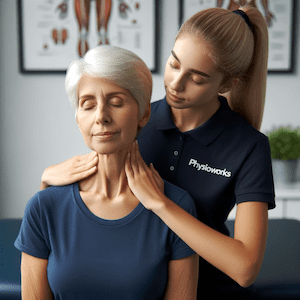

FAQs on Neck Treatment
Your Road to Relief Relieving Neck Pain - What Can You Do?
- Explore various methods to relieve neck pain.
Dealing with a Wry Neck - Can You Fix It?
- Learn about treatments and remedies for a wry neck.
Banishing Neck and Arm Pain - How's It Possible?
- Understand the connection between neck and arm pain and how to alleviate it.
Physiotherapy FAQs - What to Expect from Physiotherapy for Neck Pain?
- Know what to expect from physiotherapy sessions for neck pain.
Medication FAQs - When is Medication Necessary for Neck Pain?
- Learn about the role of medication in managing neck pain.
Surgery FAQs - When is Neck Surgery Considered as an Option?
- Find out when surgery becomes a necessary option for neck pain.
Neck Exercises
Exercise FAQs - What Neck Exercises Can Help Alleviate Discomfort?
- Discover exercises that can help in reducing neck discomfort.
Strengthening and Stabilising Your Neck - How It's Done
- Learn techniques to strengthen and stabilise your neck.
Stretching FAQs - How Can Stretching Benefit Your Neck Health?
- Understand the benefits of neck stretching exercises.
Neck, Vertigo & Dizziness FAQs
Can Your Neck Trigger Vertigo or Dizziness?
- Explore the link between neck issues and vertigo or dizziness.
Headache FAQs
Solving Neck-Related Headaches
- Find solutions for headaches caused by neck problems.
Bid Farewell to Neck Headaches - How to Do It
- Learn strategies to overcome neck-related headaches.
Posture FAQs
Correcting Years of Poor Posture
- Get tips on how to correct long-standing poor posture.
Improving Your Posture - What Steps to Take
- Understand the steps necessary for improving your posture.
Posture Improvement Products & FAQs - Your Posture Allies
- Discover products that can aid in improving your posture.
Lifestyle and Ergonomics FAQs
How Can Your Daily Habits Affect Neck Health?
- Learn how everyday habits impact neck health.
Pillow FAQs
Finding the Perfect Pillow
- Tips on how to find the ideal pillow for neck support.
Pillows: The Ultimate Guide
- A comprehensive guide to choosing the right pillow.
Healthiest Sleeping Postures - What Are They?
- Understand the best sleeping postures for neck health.
Choosing the Best Pillow - What Works for You?
- Guidance on selecting the best pillow based on individual needs.
Identifying an Unsupportive Pillow - The Telltale Signs
- Learn the signs of a pillow that doesn't provide adequate support.














